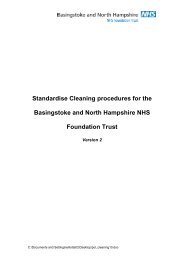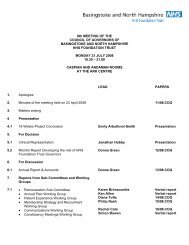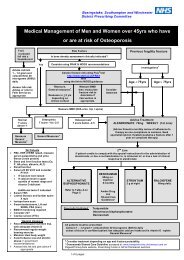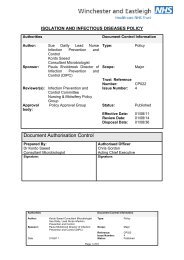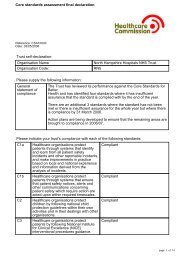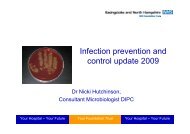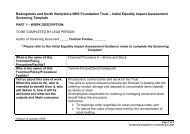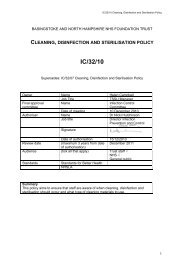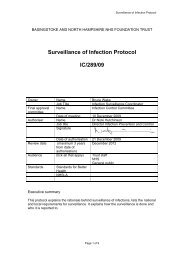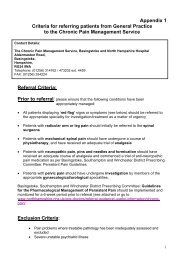Policy for the management and control of diarrhoea and vomiting
Policy for the management and control of diarrhoea and vomiting
Policy for the management and control of diarrhoea and vomiting
You also want an ePaper? Increase the reach of your titles
YUMPU automatically turns print PDFs into web optimized ePapers that Google loves.
Winchester & Eastleigh Healthcare NHS Trust<br />
POLICY FOR THE MANAGEMENT AND CONTROL OF DIARRHOEA<br />
AND VOMITING (NOROVIRUS) INFECTIONS<br />
4. Alcohol h<strong>and</strong> rub is not reliably effective against norovirus so wash your h<strong>and</strong>s<br />
with soap <strong>and</strong> water after each contact with affected patients or <strong>the</strong>ir immediate<br />
environment<br />
5. Discard all food from <strong>the</strong> surfaces <strong>of</strong> lockers. All patient food to be located<br />
INSIDE lockers. Staff food to be located in staff area only.<br />
6. In<strong>for</strong>m <strong>the</strong> ward matron <strong>and</strong> IPCT as soon as possible when a patient on <strong>the</strong><br />
ward has <strong>diarrhoea</strong><br />
7. If it appears <strong>the</strong>re are 2 cases <strong>of</strong> <strong>vomiting</strong> or <strong>diarrhoea</strong> in <strong>the</strong> same bay/ward,<br />
in<strong>for</strong>m <strong>the</strong> IPCT immediately (at 8am if overnight or <strong>the</strong> microbiologist on call at<br />
<strong>the</strong> weekend)<br />
8. Diarrhoeal stool samples should be sent to <strong>the</strong> laboratory <strong>for</strong> processing<br />
immediately (virology requesting norovirus, microbiology requesting c&s <strong>and</strong> C.<br />
difficile toxin)<br />
9. Ensure enhanced cleaning <strong>of</strong> ward <strong>and</strong> equipment (1% hypochlorite/ sporocidal<br />
agents/single use equipment where possible)<br />
10.If you become unwell with <strong>diarrhoea</strong> or <strong>vomiting</strong> stay at home (or if it occurs in<br />
shift, in<strong>for</strong>m senior <strong>and</strong> go home immediately) <strong>and</strong> do not return to work until 48<br />
hours symptom free<br />
Document adopted from <strong>the</strong> HPA <strong>and</strong> NHS London Ten Top Tips<br />
Top Ten Tips to help prevent outbreaks <strong>of</strong> Norovirus<br />
Ten Top Tips <strong>for</strong> infection prevention & <strong>control</strong> teams<br />
1. Ensure annual updates on infection prevention & <strong>control</strong> to all clinical staff<br />
include <strong>the</strong> awareness <strong>and</strong> importance <strong>of</strong> <strong>diarrhoea</strong> <strong>management</strong> <strong>and</strong> o<strong>the</strong>r<br />
relevant policies (disseminate top ten tips).<br />
2. When a ward team in<strong>for</strong>ms you <strong>of</strong> 2 or more cases <strong>of</strong> <strong>diarrhoea</strong> or <strong>vomiting</strong> on<br />
ward, attend ward <strong>and</strong> assess all pts <strong>for</strong> <strong>diarrhoea</strong> <strong>and</strong> <strong>vomiting</strong> on <strong>the</strong> same<br />
day <strong>and</strong> make a decision about bay or ward closure.<br />
3. If you institute a bay or ward closure activate <strong>the</strong> incident/outbreak <strong>control</strong><br />
policy<br />
4. Post “restricted entry” <strong>and</strong> “infection <strong>control</strong>” signs on entrance <strong>and</strong> exit to<br />
in<strong>for</strong>m visitors <strong>and</strong> healthcare staff (where possible assign a mobile h<strong>and</strong><br />
washing unit to entrance/exits, if no sink already present)<br />
5. In<strong>for</strong>m Bed Management team, Comms team, DIPC, local HPU, local PCT<br />
infection <strong>control</strong> lead<br />
6. Ensure ward staff aware <strong>of</strong> policies <strong>and</strong> actions (Disseminate TOP TEN TIPS to<br />
appropriate groups)<br />
7. Ensure laboratories aware <strong>of</strong> potential outbreak <strong>and</strong> requirements <strong>for</strong> testing<br />
8. Ensure cleaning staff aware <strong>of</strong> outbreak <strong>and</strong> know <strong>the</strong> expected cleaning<br />
regimen; where necessary observe practice <strong>and</strong> per<strong>for</strong>m audits<br />
9. Attend ward daily <strong>and</strong> per<strong>for</strong>m appropriate surveillance (daily line list, daily epicurve,<br />
daily sitrep to pre-determined parties)<br />
10.When no new cases have occurred <strong>for</strong> at least 72 hours <strong>and</strong> all symptomatic or<br />
exposed cases are isolated/ cohorted, deep clean <strong>and</strong> re-open <strong>the</strong> ward.<br />
Review <strong>the</strong> outbreak <strong>management</strong> <strong>and</strong> disseminate any lessons learnt from <strong>the</strong><br />
outbreak throughout <strong>the</strong> hospital.<br />
Authorities<br />
Document Control In<strong>for</strong>mation<br />
Author:<br />
Dr Parnaby<br />
Type:<br />
<strong>Policy</strong><br />
Consultant Microbiologist<br />
Sponsor: Members <strong>of</strong> <strong>the</strong> Infection Prevention & Scope:<br />
Major<br />
Control Committee<br />
Reference:<br />
CP101<br />
Issue Number: 2<br />
Date July 2011 Status: Published<br />
Page 22 <strong>of</strong> 26



